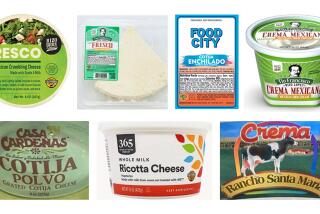Foods Tied to Potentially Fatal Infection : Health: Researchers identify soft Mexican-style cheeses, deli items and undercooked chicken as prime suspects for transmitting listeriosis, an intestinal illness.
Federal researchers have identified several processed or ready-to-eat foods as the likely source of a potentially deadly intestinal infection, according to an article in today’s Journal of the American Medical Assn.
Soft Mexican-style cheeses, foods purchased from supermarket delicatessen counters and undercooked chicken were identified by Centers for Disease Control researchers as prime suspects for transmitting Listeria monocytogenes, an uncommon bacterial disease.
One of the largest listeriosis outbreaks in this country occurred in Los Angeles County in 1985, infecting 142 people and claiming 46 lives--mostly fetuses and newborns.
Most healthy people can consume food containing the bacteria without suffering ill effects. But a high-risk group including pregnant women, cancer patients, diabetics and those suffering from AIDS is more susceptible and accounts for most cases, the CDC researchers said.
Dr. Anne Schuchat, who led the study, said AIDS patients are at 300 times the risk of infection as the general population. Pregnant women have 20 times the risk of acquiring the disease than the public, she said.
Initial symptoms can be flu-like, including fever, nausea, vomiting and diarrhea. But listeriosis can also manifest itself as brain infections such as meningitis, or as blood infections.
According to CDC estimates, there are an estimated 1,850 cases of the ailment and 425 deaths due to the ailment each year in this country. About 23% of those afflicted die--a fatality rate that is “substantially higher than that associated with other food-borne illnesses (such as salmonella),” the article said.
The CDC researchers examined cases in California, Tennessee, Georgia and Oklahoma between November, 1988, and December, 1990. The researchers studied 165 listeriosis patients and concluded that “patients with listeriosis were more likely than controls (individuals who are not ill) to have eaten foods purchased from store delicatessen counters, Mexican-style and feta cheeses, and undercooked chicken.” Thirty-two percent of the patients reported eating those types of food.
The highest rate of infection was found in San Francisco, which researchers attributed to the prevalence of AIDS in that city, and in Los Angeles, where Latino populations may be more exposed to the types of cheese that harbor the disease.
Since the 1985 outbreak in Los Angeles County, federal health officials have kept a more watchful eye on preparation of cooked, ready-to-eat foods. Between 1987 and last month, the U.S. Food and Drug Administration recalled 516 contaminated products, including soft cheese, smoked fish and prepared salads.
The U.S. Department of Agriculture’s Food Safety and Inspection Service, which operates the nation’s meat inspection program, recalled 46 contaminated products--hot dogs, luncheon meats, meat salads--between 1987 and the first part of 1992.
“The (CDC study) is an indication of how widespread listeria is in the food supply,” said David M. Theno, founder of Theno & Associates in Modesto, a food industry microbiological consultant. “We know whom it attacks and the products where it is most likely present or could grow. With all that information we can devise control strategies to prevent it, which are being done today.”
Despite the intensified federal and food industry efforts to control the bacteria in processed foods, the infection rates have declined only slightly, CDC researchers stated in the article.
There are encouraging signs, however. In California, the Health Services Department reported 175 cases in 1991, compared to 217 in 1990, or a decline of 19%.
Schuchat said that preliminary, unpublished data from Los Angeles and San Francisco indicates that the incidence of listeriosis in the two California cities is “decreasing substantially,” possibly by as much as 40%.
Consumer Cautions
The Centers for Disease Control and the Food and Drug Administration issued several recommendations on how consumers can protect themselves from listeriosis. They include:
* Thoroughly cook raw beef, pork, poultry and other food from animal sources such as eggs or fish.
* Wash raw vegetables thoroughly.
* Keep uncooked meats separate from vegetables and cooked or ready-to-eat foods.
* Avoid raw milk or foods made from raw milk.
* Wash hands, knives, cutting boards and counter surfaces after they come in contact with uncooked foods.
* Keep refrigerators clean and cold. Set at a temperature between 34 and 40 degrees Fahrenheit.
A separate, additional set of recommendations was issued for high-risk individuals:
* Avoid soft cheese, including Mexican-style varieties such as queso blanco and queso fresco, feta, brie, Camembert and blue-veined cheese. There is no need to avoid hard cheese, cream cheese, cottage cheese or yogurt.
* “Leftover” foods or ready-to-eat foods, such as hot dogs, should be reheated until steaming-hot before eating.
* Consider avoiding foods from delicatessen counters or thoroughly reheat such luncheon meats before eating.






